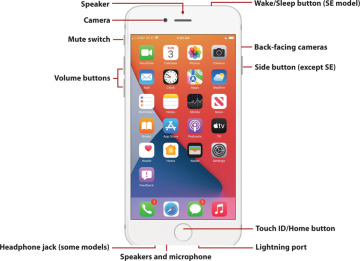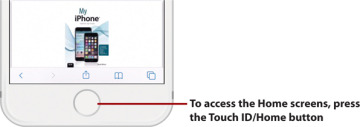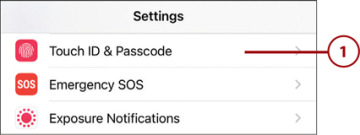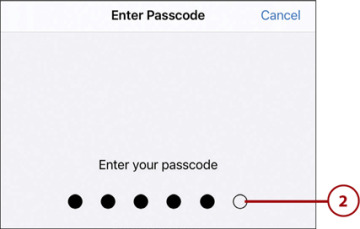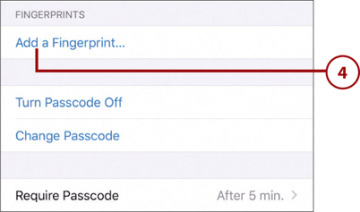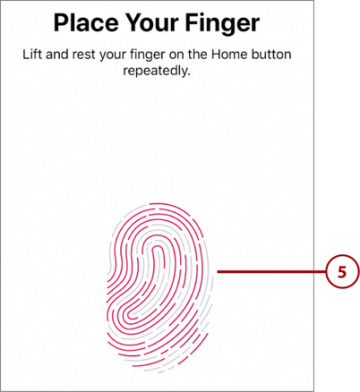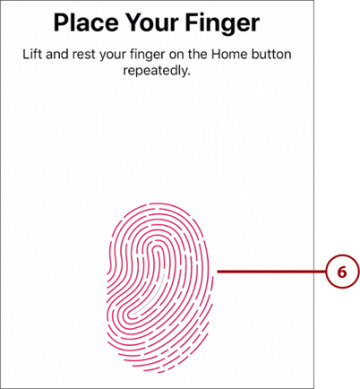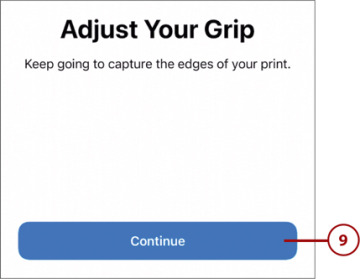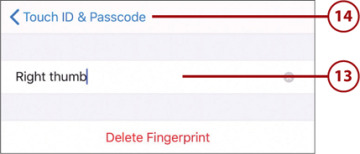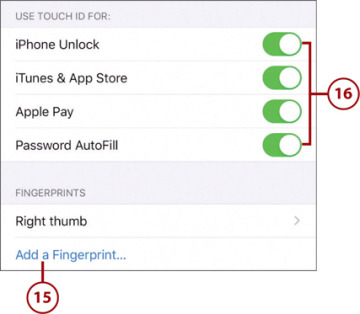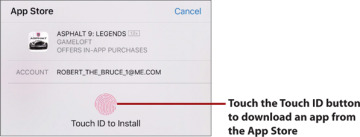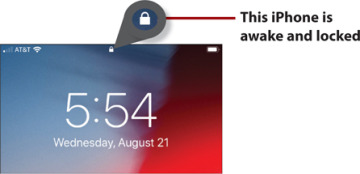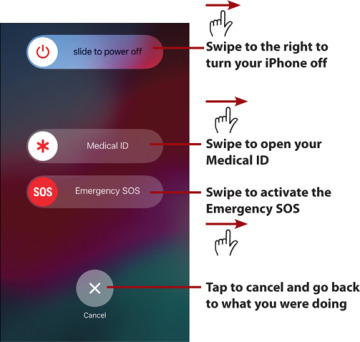- Getting Started
- Getting Started with iPhones without a Touch ID/Home Button
- Getting Started with iPhones with a Touch ID/Home Button
- Using the Split-Screen on iPhone 13 Pro Max, 12 Pro Max, 11 Pro Max, Xs Max, or Plus Models
Getting Started with iPhones with a Touch ID/Home Button
The primary distinguishing physical feature of these models compared to later models is the presence of the Touch ID/Home button. Because of this button, the screens on these models are smaller relative to their case size than the later models that don’t have a Touch ID/Home button.
Getting to Know iPhones with a Touch ID/Home Button
iPhones with a Touch ID/Home button have the following physical features:
Cameras—Every iPhone has a camera on the frontside that you usually use to take selfies (you can use it for any kind of photo or video you want to take).
Every iPhone has at least one back-facing camera too; different models have different configurations of back-facing cameras that provide a variety of photographic capabilities.
The models have cameras of different quality, with the later models having higher quality cameras than earlier models.
Side button—Press this button (on the SE, this is called the Sleep/Wake button and is located on the top of the phone instead of on the side) to lock the iPhone’s screen and put it to sleep. Press it again to wake the iPhone from Sleep mode. You also use this button to shut down the iPhone and to power it up.
Mute switch—This switch determines whether the iPhone makes sounds, such as ringing when a call comes in or making the alert noise for notifications, such as for an event on a calendar. Slide it toward the front of the iPhone to hear sounds. Slide it toward the back of the iPhone to mute all sound. When muted, you see orange in the switch. When you move the switch, you also see an onscreen alert.
Volume—Press the upper button to increase volume; press the lower button to decrease volume. These buttons are contextual; for example, when you’re listening to music, they control the music’s volume, but when you aren’t, they control the ringer volume. When you’re using the Camera app, pressing either button takes a photo.
Lightning port—Use this port, located on the bottom side of the iPhone, to plug in wired EarPods or connect it to a computer or power adapter using the included USB cable. Some accessories also connect to this port. Lightning plugs are flat, thin, and rectangular. It doesn’t matter which side is up when you plug something into this port.
Headphone jack (some models)—Some earlier models have a standard 3.5 mm jack that can be used for headphones (such as the older EarPods) and powered speakers. Most models don’t have this and instead use the Lightning port to connect to other devices, including EarPods.
Touch ID/Home button—The Touch ID sensor recognizes your fingerprint, so you can simply touch it to unlock your iPhone, sign in to the iTunes Store, use Apple Pay, and enter your password in Touch ID–enabled apps.
You also use it for several other actions, such as waking and unlocking your phone, moving to the Home screens, opening the App Switcher, and opening the magnifier.
Speakers and microphone—At the top center of the front of the phone is the speaker you use to listen when you have the phone held against your head. There are two more speakers located along the bottom edge of the phone. If you’re having a hard time hearing (because of background noise for example), holding this edge to your ear can help.
There is also a microphone located along the bottom edge that captures sound, such as during a phone conversation, when you aren’t using another device (for example, EarPods).
Accessing the Home Screens
You move to the Home screen you were using most recently by pressing the Touch ID/Home button.
Configuring a Passcode and Touch ID
A passcode is a series of characters that must be entered on your phone to perform specific actions, the most important of which is unlocking your iPhone so you can use it. Although you can use an iPhone without a passcode, I strongly recommend that you always use a passcode to protect your iPhone’s data.
While typing a passcode is fairly quick and easy, when you use Touch ID, you don’t need to do that very often. (A passcode is always required when you restart your iPhone.)
Touch ID can also be used to enter user account information, such as passwords. So, instead of having to type your passwords, you can touch the Touch ID/Home button to sign into accounts, download apps, or in just about any other situation in which you need to verify your identity.
When you first started your iPhone, you were prompted to configure a passcode and Touch ID. Even if you have already configured a passcode and Touch ID on your phone, you should know how to change your settings in the event you want to make updates and to ensure you are making the most of Touch ID’s capabilities.
The steps to set up or update your passcode and Touch ID follow:
 Tap Settings on the Home screen to open the Settings app; then tap Touch ID & Passcode.
Tap Settings on the Home screen to open the Settings app; then tap Touch ID & Passcode.
 Enter your passcode.
Enter your passcode.
 Tap Done; if necessary (not shown in a figure).
Tap Done; if necessary (not shown in a figure).
 Tap Add a Fingerprint.
Tap Add a Fingerprint.
 Touch the finger you want to record to the Touch ID/Home button, but don’t press it. An image of a fingerprint appears.
Touch the finger you want to record to the Touch ID/Home button, but don’t press it. An image of a fingerprint appears.
 Leave your finger on the Touch ID/Home button until you feel the phone vibrate, which indicates part of your fingerprint has been recorded. The parts of your fingerprint that are recorded are indicated by the red segments; gray segments are not recorded yet. This step captures the center part of your finger.
Leave your finger on the Touch ID/Home button until you feel the phone vibrate, which indicates part of your fingerprint has been recorded. The parts of your fingerprint that are recorded are indicated by the red segments; gray segments are not recorded yet. This step captures the center part of your finger.
 Lift your finger off the Touch ID/Home button and touch the button again, adjusting your finger on the button to record other parts that currently show gray lines instead of red ones. Other segments of your fingerprint are recorded.
Lift your finger off the Touch ID/Home button and touch the button again, adjusting your finger on the button to record other parts that currently show gray lines instead of red ones. Other segments of your fingerprint are recorded.
 Repeat step 7 until all the segments are red. You’re prompted to change your grip so you can record more of your fingerprint.
Repeat step 7 until all the segments are red. You’re prompted to change your grip so you can record more of your fingerprint.
 Tap Continue.
Tap Continue.
 Repeat step 7, again placing other areas of your finger to fill in more gray lines with red. When the entire fingerprint is covered in red lines, you see the Complete screen (not shown in a figure).
Repeat step 7, again placing other areas of your finger to fill in more gray lines with red. When the entire fingerprint is covered in red lines, you see the Complete screen (not shown in a figure).
 Tap Continue (not shown in a figure). The fingerprint is recorded and you move back to the Touch ID & Passcode screen. You see the fingerprint that has been recorded.
Tap Continue (not shown in a figure). The fingerprint is recorded and you move back to the Touch ID & Passcode screen. You see the fingerprint that has been recorded.
 Tap the fingerprint you recorded.
Tap the fingerprint you recorded.
 Give the fingerprint a name.
Give the fingerprint a name.
 Tap Touch ID & Passcode (<).
Tap Touch ID & Passcode (<).
 Repeat steps 4–14 to record up to five fingerprints. These can be yours or someone else’s if you want to allow another person to access your iPhone.
Repeat steps 4–14 to record up to five fingerprints. These can be yours or someone else’s if you want to allow another person to access your iPhone.
 Use the switches in the USE TOUCH ID FOR section to enable (green) or prevent (white) Touch ID being used for that purpose.
Use the switches in the USE TOUCH ID FOR section to enable (green) or prevent (white) Touch ID being used for that purpose.
Using Touch ID
You can use Touch ID to quickly, easily, and securely provide your passcode (for example, to unlock your phone) or a password (such as the one you need to enter to sign into your account on a shopping website).
For example, to download an app using Touch ID, move to the app’s screen in the App Store app and tap the Get or price button. At the prompt, touch the Touch ID/Home button. When your fingerprint is recognized, the app is downloaded and installed.
Using Touch ID in other situations is similar. When you see the Touch ID prompt, simply touch the Touch ID/Home button.
Sleeping/Locking and Waking/Unlocking Your iPhone
It’s a good idea to manually lock your iPhone when you aren’t using it to both save battery power and secure your information. (You can configure this to happen automatically as explained in Chapter 7.)
To put your iPhone to sleep and lock it, press the Side button (the Sleep/Wake button on iPhone SE models). The screen goes dark and the phone locks.
To wake up and unlock the phone, lightly press and hold on the Touch ID/Home button for a second or so. The phone wakes up and unlocks and you move to the screen you were most recently using.
If you don’t use your iPhone for a while, it automatically goes to sleep and locks according to the preference you have set for it (this is covered in Chapter 7).
Turning Your iPhone Off or On
You seldom need to turn your iPhone off, but you might want to if you aren’t going to be using it for a while or for troubleshooting purposes.
To turn your iPhone off, press and hold the Side button (Sleep/Wake button on an SE) and either Volume button. Sliders appear on the screen; swipe the top slider to the right. The phone turns off.
To restart your iPhone, press and hold the Side button (Sleep/Wake button on an SE) until the Apple logo appears on the screen, and then let go of the button.
After it starts up, you see the Lock screen. To use the phone, press the Touch ID/Home button. Assuming you have a passcode, you see the Enter Passcode screen. Enter your passcode to start using your phone; once your passcode is entered correctly, you move to the Home screen. (Even if you have Touch ID enabled to unlock your phone, you must enter your passcode the first time you unlock it after a restart.)
